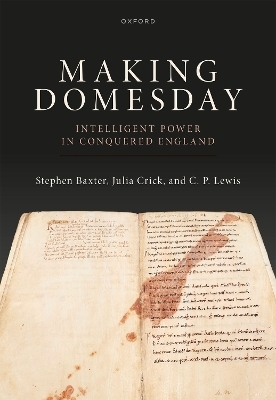
Making Domesday
Oxford University Press (Verlag)
978-0-19-885012-0 (ISBN)
- Noch nicht erschienen (ca. Juli 2025)
- Versandkostenfrei innerhalb Deutschlands
- Auch auf Rechnung
- Verfügbarkeit in der Filiale vor Ort prüfen
- Artikel merken
Making Domesday presents a fresh interpretation of William the Conqueror's survey of England, made possible by a major collaborative study and a new online edition of Exon Domesday, the earliest of the three original manuscripts to survive from the Domesday survey. The book addresses big questions about pre-modern government, written records, and the use of intelligence in both senses: the minds behind the planning and execution of Domesday, and the information about England that Domesday gathered. It characterizes Exon as the surviving part of the 'working papers' of one of the writing offices that over a period of ten weeks in summer 1086 dealt with all seven 'circuits' (regional groupings of shires) of the Domesday survey. The circuit offices had the task of recasting the manorial descriptions assembled in an earlier stage of the survey into an interim form intended for further redaction as Great Domesday Book by rearrangement, rewording, and abbreviation. A new deep understanding of the codicology and palaeography of Exon underpins every part of the analysis, and offers a model of documentary production for royal government at an exceptionally early period in western Europe. Part I describes and analyses each Exon text in unprecedented detail; Part II places Domesday in context and in broad comparative perspective, ranging across and beyond the Latin West. The dual approach provides a new interpretation of Domesday and a deeper understanding of both the Domesday survey and Domesday Book. It emerges that the survey was even more complex than we had dared to imagine, involving the production of different kinds of text intended to meet a range of fiscal and political needs. It is also clear that the survey was immediately effective, transforming the politics of land in a newly conquered society. Domesday has always been thought awesome, as its very name shows; Making Domesday contends that it was also a feat of intelligent government deployed by an aggressive and ambitious regime. As such it speaks to broader concerns with the colonial domination of conquered societies through the purposeful collection of systematic statistical information.
Stephen Baxter read History as an undergraduate at Wadham College, Oxford, and, following a short career in strategy consulting and investment banking, returned to Oxford to read for his doctorate at Christ Church. He was elected a Fellow by Examination at Magdalen College, Oxford, and then joined the History Department at King's College London as Lecturer and Senior Lecturer in Medieval History. He was appointed Clarendon Associate Professor and Barron Fellow in Medieval History at St Peter's College, Oxford, in 2014, and became Professor of Medieval History there in 2020. He has published widely on politics, government, and society in early medieval England. Julia Crick read Anglo-Saxon, Norse, and Celtic and History at Gonville and Caius College, Cambridge, completing her doctorate in the same institution. She held a JRF and Official Fellowship at Caius before moving to the University of Exeter to take up a Lectureship in Medieval History, becoming Senior Lecturer and Associate Professor. In 2012 she was appointed Professor of Palaeography and Manuscript Studies at King's College London. Between 2014 and 2017 she was Principal Investigator of the Exon Domesday research project (AHRC grant reference AH/L013975/1). C. P. Lewis read History and completed a DPhil at Merton College, Oxford. He joined the staff of the Victoria County History in 1982, working on Cambridgeshire, and later was county editor for Cheshire and then Sussex, taking early retirement in 2009. Since then he has been a research assistant on projects involving Domesday Book. He is a senior fellow at the Institute of Historical Research, University of London. His research interests and publications are on English and Welsh history in the central Middle Ages, English local and regional history, the historiography of English local history, and onomastics.
Introduction
Part I: Exon: The Earliest Manuscript of the Domesday Survey
1: The Anatomy of Exon
2: The Form and Shape of the Manuscript
3: The Exon Geld Accounts and the Great Geld of 1085-1086
4: Exon Fiefs I: The First Draft of Domesday
5: Exon Fiefs II: The Lists of Hundreds
6: Exon Fiefs III: The Sources of Information
7: Exon Fiefs IV: Compiling the Fiefs Booklets
8: Terrae Occupatae: Recording Unauthorized Tenures
9: The Fief Summaries
10: Writing Great Domesday Book
11: Inside the Exon Office: The Making of Domesday Imagined
Part II: Placing Domesday
12: 1085 and the Invasion Threat
13: The Significance of King Henry I's Pipe Roll
14: Estate Management and Written Records in England and on the Continent Before Domesday
15: Domesday and the Geld
16: The Profits of Royal Lordship
17: Title to Property in the Age of the Great Confiscation
18: The Men Behind the Survey
Part III: Conclusions
19: Making Domesday
20: Intelligent Power in Conquered England
| Erscheinungsdatum | 03.09.2024 |
|---|---|
| Verlagsort | Oxford |
| Sprache | englisch |
| Maße | 171 x 246 mm |
| Themenwelt | Geschichte ► Allgemeine Geschichte ► Mittelalter |
| Geisteswissenschaften ► Geschichte ► Regional- / Ländergeschichte | |
| ISBN-10 | 0-19-885012-3 / 0198850123 |
| ISBN-13 | 978-0-19-885012-0 / 9780198850120 |
| Zustand | Neuware |
| Informationen gemäß Produktsicherheitsverordnung (GPSR) | |
| Haben Sie eine Frage zum Produkt? |
aus dem Bereich


